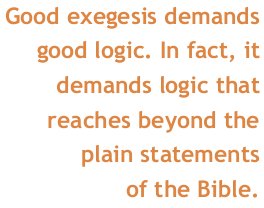Shall We Reason Together? Part Three: The God Who Reasons
 While verbal inspiration is not dictation, it nevertheless implies that what Scripture affirms, God affirms. Inspiration did not obliterate the human personalities of the biblical authors, who certainly made free choices about what they would write and how they would write it.
While verbal inspiration is not dictation, it nevertheless implies that what Scripture affirms, God affirms. Inspiration did not obliterate the human personalities of the biblical authors, who certainly made free choices about what they would write and how they would write it. Nonetheless, their choices were guided by the Holy Spirit so that the Scriptures are the very Word of God. This is a key principle: what Scripture says, God says, and what Scripture does, God does. One of the things that Scripture does is to reason. The Bible is packed full of logic. Granted, the biblical text incorporates few explicit syllogisms. The writers of Scripture prefer to reason in enthymemes. They are constantly resting their conclusions upon inferences, the validity of which they expect their readers to grasp.
Nonetheless, their choices were guided by the Holy Spirit so that the Scriptures are the very Word of God. This is a key principle: what Scripture says, God says, and what Scripture does, God does. One of the things that Scripture does is to reason. The Bible is packed full of logic. Granted, the biblical text incorporates few explicit syllogisms. The writers of Scripture prefer to reason in enthymemes. They are constantly resting their conclusions upon inferences, the validity of which they expect their readers to grasp.
Consider Isaiah’s satire about idolatry (Isa. 44:10‐20). A man plants and tends a tree in the forest. When the tree is mature, the man cuts it down and burns it in order to warm himself and bake his bread. He takes a bit of the tree to a carpenter, however, who planes it, marks it, and fashions it into an image. The man keeps the image in his house, falls down before it, worships it, and prays, “Deliver me, for you are my god.”
The core of Isaiah’s sarcasm involves a line of reasoning that he never makes explicit. If I may translate Isaiah’s satire into a syllogism, it goes something like this:
Nothing that humans must tend and fashion can be a god.
All idols must be tended and fashioned by humans.
Therefore, no idol can be a god.
The foregoing syllogism is certainly valid. The meaning of the passage depends upon its validity. Anyone who fails to grasp the validity of the syllogism will surely miss Isaiah’s point. A person who cannot reason cannot exegete this passage.
The same is true of Paul’s argument concerning justification through faith (Rom. 4:9‐12). Paul asks whether God will justify only Jews (the “circumcision”), or both Jews and Gentiles (the “uncircumcision”), through faith. In answer, he notes that God justified Abraham through faith before Abraham was circumcised, i.e., while Abraham was a Gentile. He argues, a fortiori, that what is true of Abraham is therefore true of all who believe.
In this argument, Paul is trading on the nature of contraries. In order to refute a universal, categorical proposition (whether affirmative or negative) only a single contrary instance is required. Paul is challenging the proposition, “No uncircumcised people are justified.” He responds with the proposition, “Some uncircumcised people (i.e., Abraham) are justified.” This is a classic refutation of an “E” statement by demonstrating the truth of a contradictory “I” statement.
Paul’s declaration about Abraham is the perfect, logical response to a false proposition, and, indeed, to a false theology. A proper understanding of Romans 4 depends upon the readers’ ability to recognize contrary propositions, as well as their willingness to accept the logical rule that contrary propositions cannot both be true. A person who cannot reason cannot exegete this passage.
Or consider Paul’s discussion of the resurrection in 1 Corinthians 15. Paul goes to great lengths (1‐11) to demonstrate empirically that Christ did rise from the dead. Then he shifts his attention to a false teaching that had emerged in the Corinthian church, namely, that there is no resurrection of the dead. His argument is summarized in verse 13: “If there is no resurrection of the dead, then Christ is not risen.” He has already shown, however, that this is not possible: Christ did rise. By denying the consequent, Paul refutes the antecedent. Paul’s strategy in 1 Corinthians 15 is, at its core, classic modus tollens. His point assumes that his readers understand conditional reasoning. A person who cannot reason cannot exegete this passage.
Similar examples of correct reasoning can be found throughout the Scriptures. The choice to include them in the Bible was not merely human, for what Scripture affirms, God affirms, and what Scripture does, God does. If the Bible is truly the Word of God, then God is a pretty good reasoner.
What is more, He evidently expects humans to learn to reason well if they are to understand His Word. Isaiah’s syllogism can be recognized as valid by all competent reasoners. Paul expects his readers to employ the principles that govern both compatibility and conditional reasoning. The writers of Scripture can entertain such expectations because a valid argument remains valid in spite of the noetic effects of sin. Contrary statements can be seen to be contrary, even without a special, illuminating ministry of the Holy Spirit. God Himself could never affirm the antecedent while denying the consequent.
Alogicals believe that sound inferences drawn from Scripture are either not authoritative or less authoritative than the direct statements of Scripture itself. We have already seen that alogicality is bad philosophy, for two reasons. Now we discover that alogicality also makes for bad exegesis. Isaiah and Paul (and Moses and Peter and John and David) expect their readers to follow arguments. When readers do not, their exegesis suffers.
What is more, the biblical writers expect their readers to be able to fill in important parts of the arguments for themselves. The major premise to Isaiah’s argument, for example, is never stated in the text. We have to supply a proposition that Isaiah simply assumes. Only when we have done that can we recognize the soundness of his argument. Good exegesis demands good logic. In fact, it demands logic that reaches beyond the plain statements of the Bible. Paul bases his theology of justification upon an inference drawn from the text of the Old Testament. The inference does not magically become authoritative because it is inspired Scripture: if inspiration were all that was required, Paul could have simply asserted his conclusion and spared us the logic. No, Paul wants us to begin with a biblical premise and then to reason along with him. He wants us to accept his conclusion, not because he asserts it under inspiration, but because he can show it to be true. The logic is in the text precisely because it is first outside of the text.
The inspired writings constantly employ sound reasoning, but inspiration is not what makes the reasoning sound. Rather, the Holy Spirit chose particular reasons because they are sound. The writers of Scripture do not ask us simply to take their word for every theological and ethical assertion. Instead, they regularly appeal to reasons, the validity and soundness of which they expect their readers to recognize. Our duty is to understand those reasons, to reproduce them in our own minds. Our duty is also to fill in certain logical gaps that the biblical writers have left for us. Only when we are willing to do that can we rightly understand what the Scriptures say.
The Dawning.
George Herbert (1633)
Awake sad heart, whom sorrow ever drowns;
Take up thine eyes, which feed on earth;
Unfold thy forehead gather’d into frowns:
Thy Saviour comes, and with him mirth:
Awake, awake;
And with a thankfull heart his comforts take.
But thou dost still lament, and pine, and crie;
And feel his death, but not his victorie.
Arise sad heart; if thou dost not withstand,
Christ’s resurrection thine may be:
Do not by hanging down break from the hand,
Which as it riseth, raiseth thee:
Arise, Arise;
And with his buriall‐linen drie thine eyes:
Christ left his grave‐clothes, that we might, when grief
Draws tears, or bloud, not want an handkerchief.

–––––-
This essay is by Kevin T. Bauder, president of Central Baptist Theological Seminary. Not every one of Central’s professors, students, or alumni necessarily agrees with every opinion that it expresses. In The Nick of Time is also archived here.
- 87 views


Discussion